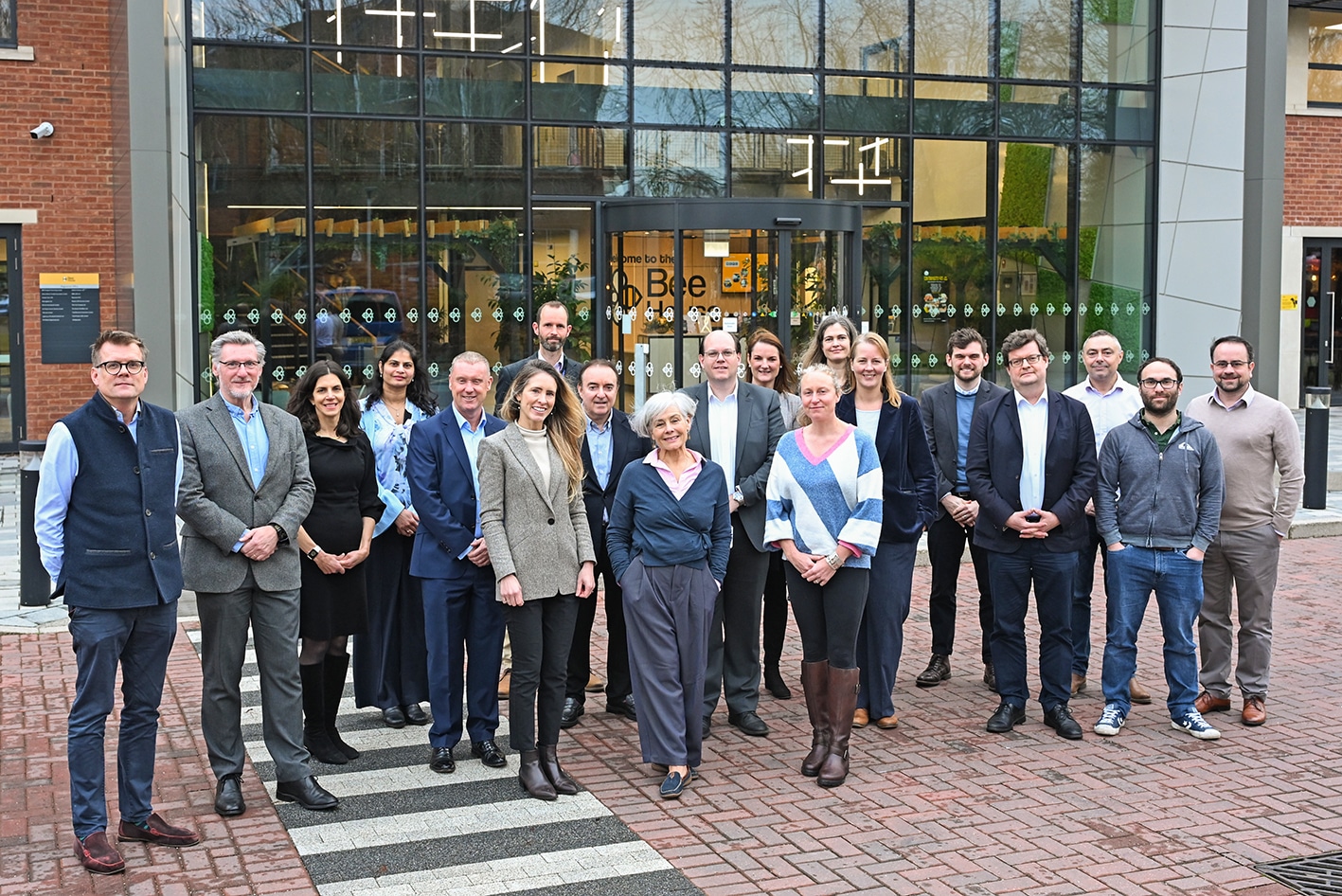Life Science roundtable with The Business Magazine
Published on 31 January 2025

The life sciences sector is a welcome jewel in the UK’s crown. While government support has improved, start-ups and scale-ups must be well prepared and presented to secure investor funding.

The new government has pledged to support the life sciences sector, but in a tough fiscal environment, it is limited in what it can do. Meanwhile, investors want to maximise the security of their investment.
Working with Nicky Godding, Editor, The Business Magazine, we invited life science and technology companies from across Oxfordshire to Milton Park for a roundtable to share some of their biggest challenges.
Dr Michalis Papadakis, co-founder and CEO at Brainomix: “The life sciences sector in the UK and globally is at an interesting juncture. Investment is driven by the validated clinical impact of a life science company’s technology.
“Last year we published some results from a three-year study we did with the NHS. It was the largest AI evaluation globally with 80,000 patients. It showed that we can increase the number of patients getting access to thrombectomy treatment for stroke by more than 50 per cent. This enabled us to get more commercial and clinical adoption.
“Investors are, more than ever, not basing investment decisions on assumptions but on hard evidence. It’s not only about technology, but about its demonstrated clinical impact to improve patient care.”
Last September, FluoRok announced that it had raised £7.7 million to scale up and commercialise.
For Gabriele Pupo, FluoRok’s founder and CEO, one of the biggest challenges for chemical companies securing investment is that chemistry intrinsically requires time and intensive capital expenditure to scale. Because of that there needs to be a clear alignment between what the company wants to achieve and investor expectations.
“Chemical manufacturing start-ups are about building very successful companies over a relatively longer period of time but that can ultimately sustain themselves for decades to come,” he said.
“Having the right investors on board who understand those timelines and share the company’s mission is essential.”
As a German company, with a significant presence in the UK at Milton Park, Evotec has a wider view.
Adam Stoten, Site Head at Evotec’s Milton Park, said: “We’re listed on NASDAQ and Frankfurt Stock Exchange, so venture investment is less relevant to us directly, but it’s highly relevant to the companies we want to be working with. We have a significant vested interest in seeing that the UK investment environment is as buoyant as possible.
“The big development last year came in the chancellor’s Mansion House speech where she announced radical reforms involving merging council pension schemes and consolidating small workplace pensions into a handful of pension megafunds.”
The government’s aim for this is to unlock around £80 billion of investment for infrastructure projects and new businesses.
“We hope that this will see more money flowing into UK venture funds.”
The government’s extension of the Enterprise Investment Scheme (EIS) and the Venture Capital Trust (VCT) was welcomed by all roundtable participants. Both were set to end next April, but last autumn the government announced a 10-year extension to April 2035.
Benign landscape for investing

But whether in life sciences or any other long-term science-based sector, investors cannot be expected to fund the necessary infrastructure to drive progress.
A government must build and support the industrial supply chains to technological and life sciences progress.
While recognising this will require significant capital investment, a government will see payback in 10 to 20 years. Gabriele Pupo said. “We want to be able to manufacture here, in Europe or the USA rather than on the other side of the world, but we all need the right environment in which to do that.”
In 2022, the USA took significant steps to support its own industries, when President Biden signed the Inflation Reduction Act (IRA). This offers millions of dollars in funding and incentives to accelerate the transition to a clean energy economy. Perhaps the UK should consider a similar UK IRA act to support the country’s burgeoning sector?
Last year, the USA also introduced the Biosecure Act, which seeks to prohibit federal agencies from contracting with or funding any company working with a “biotechnology company of concern”.
For UK life sciences and other technology companies looking scale in the USA, they may have to locate manufacturing facilities there rather than at home. But that could mean knock-on positive effects for Europe as life sciences and tech companies pivot away from suppliers further afield to ones closer to home.
In the meantime, the previous UK government had a £520 million life sciences innovation manufacturing fund. This supports businesses investing in life sciences manufacturing projects in the UK.
“These are promising signs from our new government,” said Adam.
Innovate UK is a force for good

Robin Cohen, founder and CEO at aVaxziPen, agreed. “Given the size of the UK economy, I think Innovate UK do an amazing job of funding early innovation for venture capital to take over when the time is right.
“European grants are also a lifeline for many start-ups.
“I agree with Gabriel that we all need to be better at finding and working with the right investors and understanding when they want an exit so we can bring in other investors at the right time.”
Dan Daly at Occuity, added: “We’re at the early stage and have raised about £7 million or so from a fairly wide range of angel investors.”
For SugaROx, substantial support from the government has walked hand in hand with engagement from private investors, according to Bianca Forte.
“To date, we have raised £2.1 million pounds from private investors and £2.4 million pounds in grants.
“If it wasn’t for these grants, SugaROx wouldn’t be here today because when we approached a private investor in the UK, Angels or VC Funds who operate in agri tech, they considered our long time to market too risky.
“Agri-tech has long research and development cycles; in our case six to eight years were expected from the launch of SugaROx to the point where we could have a product in the market.
“We developed business plans to address the most critical questions at different stages of venture development.
By obtaining a grant to reduce risks for each cycle, we could persuade private investors who had the confidence to match the public funding.”

But Prathiba Kurupati, founder and CEO at GeneOmics Solutions, said it would be good to see more differentiation between start-ups and scale-ups in the funding environment.
“As things stand, Innovate UK put young businesses still at the early stage in the same grant funnel as those with proof of concept. This means that those further ahead are much more likely to secure grants.
“It’s like mixing up elementary school students with graduates.”
“There are some feasibility grants which are there for young companies, but there are many more industrial grants.”
Jo Brewer, Chief Scientific Officer at Adaptimmune said that government support is a lot better now than it used to be.
“Adaptimmune has raised more than a billion dollars since our inception in 2000. But such is our science that it hasn’t been possible to raise enough funding in the UK so we went to the USA to undertake clinical trials, because the infrastructure wasn’t here in the UK at the time.”
“However, one of the really nice things to see is the number of start-up companies that are now being supported in the UK.
“While there is still an acknowledged death-valley of funding, more people understand that life sciences investing is a long-term game. It took us 16 years to launch our first product on the market and we still need to raise more money, so are currently undertaking a restructure to be in the best shape to raise that capital.”
Athene Blakeman, General Counsel at Oxford Science Enterprises, added: “The bit that’s missing in the UK eco system is interim liquidity that isn’t a NASDAQ IPO. It would be interesting to have an early phase of investment where seed investors stay through to series B or C and then they can sell down to a later stage investor. There’s an erroneous perception that if early-stage investors want to sell down, the company’s not worth investing in.”

Infrastructure is very important to support young companies. Philip Campbell, Commercial Director at Milton Park, said.
“Using legislation to activate a better investment landscape into these companies, and at a real estate and infrastructure level to achieve a better planning landscape, such as the Milton Park LDO which enables 10-day planning, we can support these companies sooner. Whether that’s transport, housing, green or energy infrastructure. It all helps to create the right environment for young companies to thrive.”
The government can only do so much
The government is very happy to listen and engage with the life sciences sector, added Jo. “But there is only so much they can do. While we have talked to them about manufacturing support often, nothing has yet come of that. However, the cell therapy catapult has been really useful. The way they’re training people to enter the job market is a valuable contribution because these are hugely specialist roles. While attracting the right talent has got easier in terms of visa applications, getting the skills we need is always going to be challenging for any life sciences company.”
“R&D tax credits are also crucial to keeping research in the UK and we don’t intend to move this to the USA.”
OMass has raised more than £129 million from top-tier international investor syndicates including Syncona, Oxford Science Enterprises, GV, Northpond Ventures, Sanofi Ventures and British Patient Capital.
Melissa Faris, its Chief Business Officer said: “R&D tax credits were very important to building the overall strategy of the company from a financial perspective and attracting US investors on top of our excellent technology and people.
“As business leaders we need to continue active involvement with the government. Having these discussions will benefit the whole of the UK, not just the life science sector.
“We have about 60 people representing more than 20 countries. So being able to have access to the right visas and continuing to attract talent, whether they’re coming straight out of universities, or coming to the UK is very important.”
Dan Daly at Occuity added: “The biggest impact for us around employment has been the changing national insurance and employment laws. This isn’t going to be easy for any small company. We also find it hard to identify skilled staff in the UK so we are also recruiting internationally.”
A gap in funding
Athene Blakeman agreed that there is a lot of help for companies at early-stage funding levels within Innovate UK but points out that there is a gap further down the line. If a company needs to manufacture, there is little funding available in the UK and it will need to go elsewhere.
“The Mansion House compact is fantastic in that respect because it will bring a lot more funding into the industry at all stages, however it’s going to be a long journey to see that translate into actual investment.
“But the cost of doing business in the UK is still a major issue for all companies.”
Four years to deliver
The new government has got four years to really deliver said Claus Andersen, life sciences partner at Freeth’s.
“And they know that one of the areas they can use to deliver is the life sciences sector, because it’s one of the areas that the UK is known for globally.
“The drive to create the sort of mega pension funds we see in places such as Canada and Australia is good, but will these pension funds be prepared to commit long term? The devil for these great commitments will be in the detail.
“The government’s focus on getting people off the NHS waiting lists and improving their health will see them be able to return to work. This means less need for companies to go overseas for staff, but it also needs to improve conditions for businesses.
“The R&D announcements give certainty, which is good. But more support is needed for manufacturing.”
“It all goes back to making sure that there are the right conditions to run a company and educating investors to think longer term.”
More long-term thinking required
Adam added: “One of the weaknesses we have in the UK is that we don’t have a credible public market for biotech companies. Most of most of our successful biotechs go public on NASDAQ, so there is that gravitational pull over to the US.”

Jason Mitchell, partner at MHA highlighted the fact that US investment in young companies often seems easier to access than in the UK.
“In terms of private equity, the companies which head to the US, or talk to our US-owned clients, seem to secure good investment more often with a much more agile process.
“While I welcome the government’s commitment to R&D tax credits, we are also seeing a lot of challenges to these credits at the moment, particularly the smaller claims, as HMRC try to crack down on fraud, where there is a perception that there has been some misuse.
Will Richmond-Coggan, Partner at Freeths, said: “The life sciences sector, like many others, needs an apolitical strategic framework and common vision, so that investors can make financial decisions over five to 10 years and not be tied to one government term.”
But Paul Townsend at MHA said that he wasn’t convinced that pension funds will be persuaded to completely change their investment strategies over extended time frames. Many pension funds need earlier returns to meet ongoing pension payments as well as certainty in income terms.
“And R&D tax credits have been cut back over the last five years to reduce government expenditure.
“But it is a global market for tax credits and perhaps the UK should try and be more competitive in this regard.”
Adam added: “France, Canada and Australia are more competitive, but that comes with its own problems. Companies in some of those jurisdictions can find it difficult to fulfil global ambitions because the tax credit benefits provide such strong incentives to work with contract research organisations in those countries only, which may lack fully integrated offerings. It can be a double-edged sword.”
Bianca at SugaROx added another important point affecting the competitiveness of UK ventures in global markets. “While we want to sell into our home market first, we cannot overlook the rest of the world in terms of food production. To develop solutions for farmers abroad, we need to test our biostimulants in the environment where they must perform. Lack of flexibility to use grant funding to run field trials in the US or Brazil, for instance, has a major impact on how quickly we can develop export opportunities.
“We find truly world-leading academic researchers in the UK. By helping spin-outs explore the potential of British technologies in international markets, the UK government would see a return from its investment into fundamental science that can change the world.”



